Module 4 Sandstorms in Asia Grammar 课件(33张PPT)
文档属性
| 名称 | Module 4 Sandstorms in Asia Grammar 课件(33张PPT) |  | |
| 格式 | zip | ||
| 文件大小 | 771.6KB | ||
| 资源类型 | 教案 | ||
| 版本资源 | 外研版 | ||
| 科目 | 英语 | ||
| 更新时间 | 2019-08-21 16:52:07 | ||
图片预览





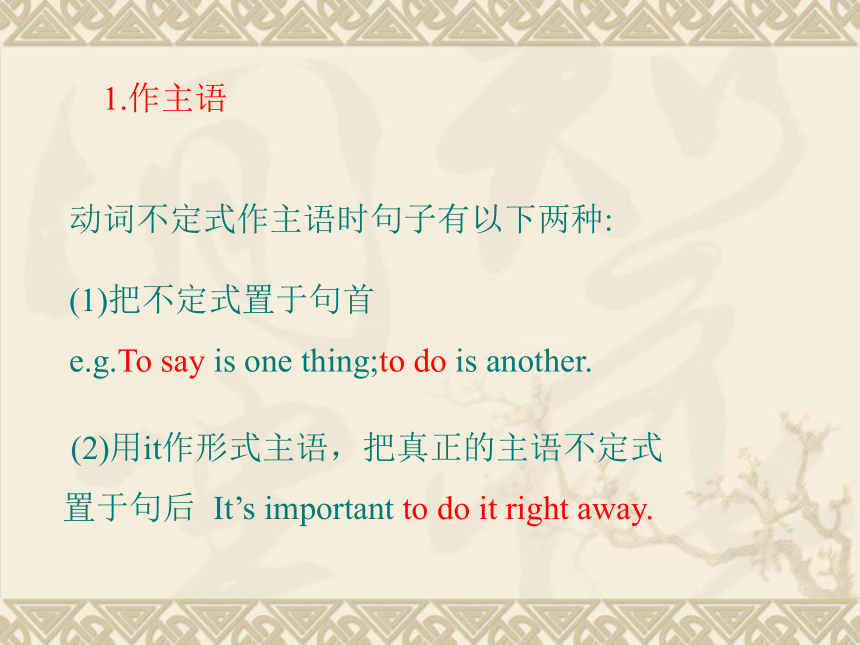
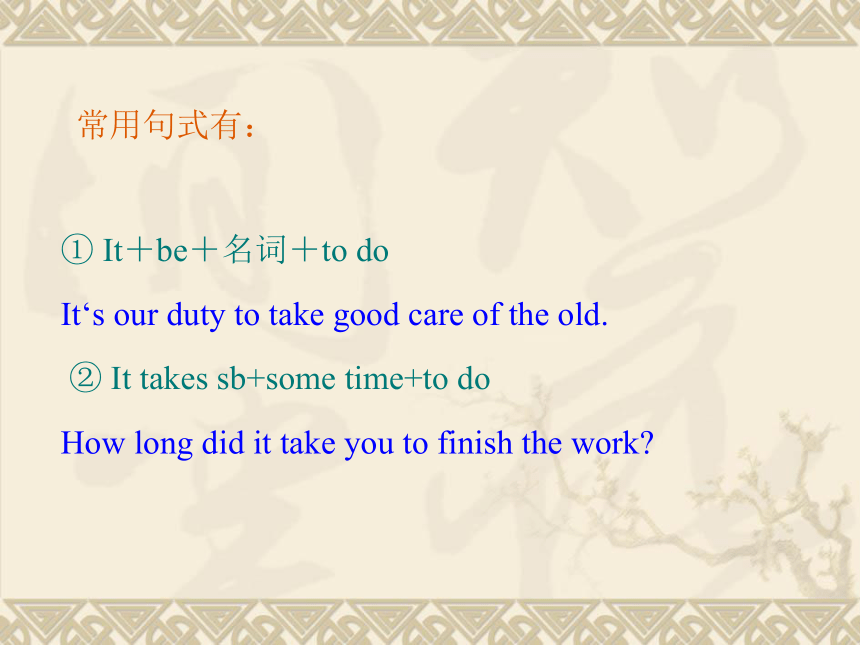
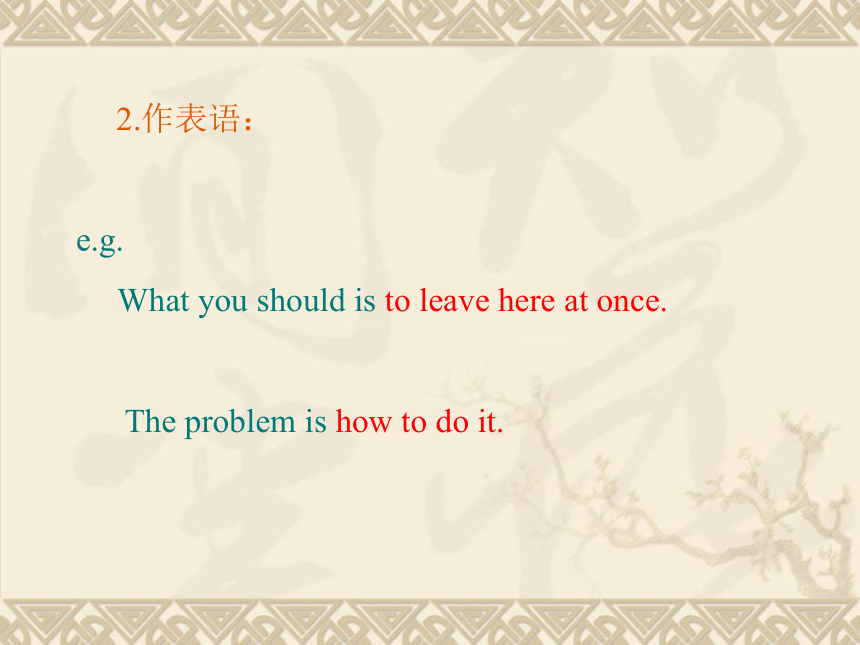


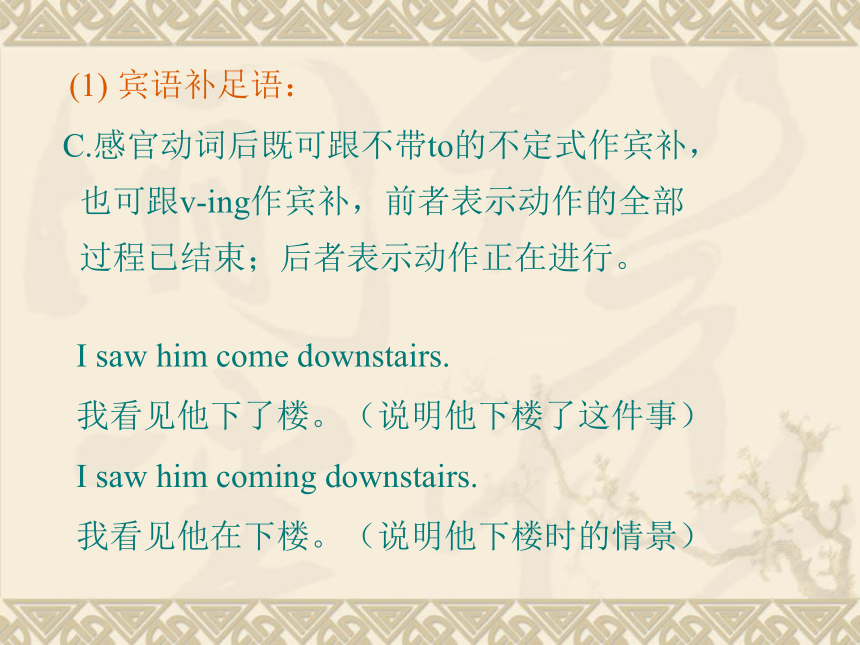
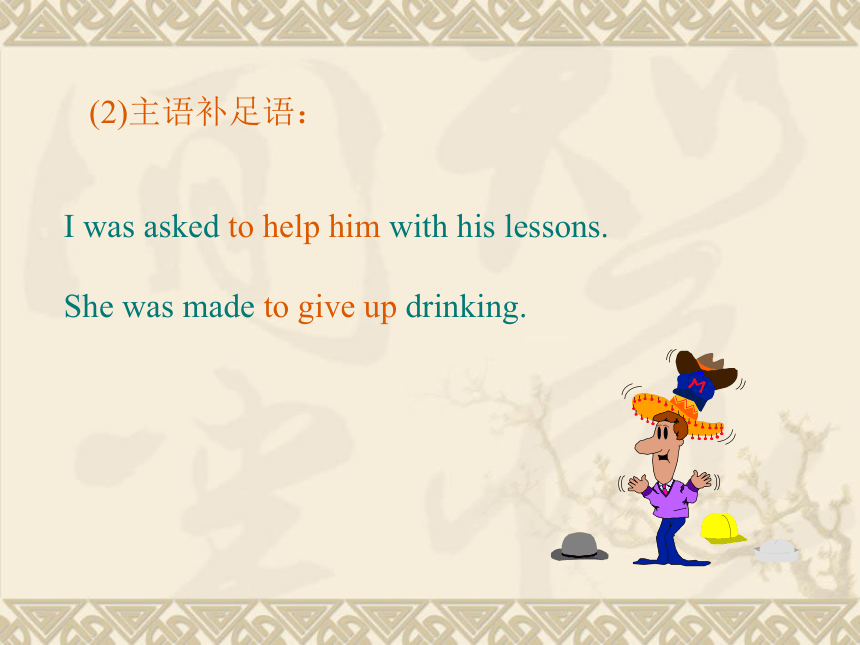
文档简介
课件33张PPT。Module4 Sandstorms in Asia Grammar One看一看1To prevent it coming nearer,the government is planting trees.
2To be cycling in a sandstorm is frighting.
3Sandstorms in Asia apper to have increased in recent years.
Our tasks(学习目标)
1 Learn the structure of infinitive.
2 Grasp the different forms of infinitive
3 Aim to use infinitive correctly.
4 Learn to cooperate with others.
try your best读一读1 To learn English is difficult.
2 I have nothing to say.
3 My father decided to give me a present.
4 To see is to believe.
5 I find it easy to study English.
6 He went home to get money. 动词不定式具有名词、形词副词的特征。因此在句中可以主语、表语、宾语、补足语语
状语。学一学1.作主语(1)把不定式置于句首
e.g.To say is one thing;to do is another. (2)用it作形式主语,把真正的主语不定式
置于句后 It’s important to do it right away.动词不定式作主语时句子有以下两种:常用句式有: ① It+be+名词+to do
It‘s our duty to take good care of the old.
??? ② It takes sb+some time+to do
How long did it take you to finish the work? ?2.作表语:e.g.
What you should is to leave here at once. The problem is how to do it. e.g. I want to buy something for him . I don’t know what to do next.3.作宾语:后面能接不定式作宾语的动词有:
agree, ask, choose, decide, forget, hope, learn, want, wish, would like等。如:4 补足语:e.g.He asked me to wait for him for a while. My father lets me go out alone at night. (1) 宾语补足语: I saw him come downstairs.
我看见他下了楼。(说明他下楼了这件事)
I saw him coming downstairs.
我看见他在下楼。(说明他下楼时的情景)C.感官动词后既可跟不带to的不定式作宾补,
也可跟v-ing作宾补,前者表示动作的全部
过程已结束;后者表示动作正在进行。(1) 宾语补足语:(2)主语补足语:I was asked to help him with his lessons.
She was made to give up drinking.5 作定语(位于名词或代词之后): e.g. Do you have anything to say?Have you got the permission to use the computer ?6 作状语(目的、结果、原因等):We eat to live; we don’t live to eat.目的状语We went to see him only to find him out.结果状语e.g.We are glad to see you.原因状语 在too…to do …;adj./adv. + enough to do…
结构中作结果状语;在in order to ;so as to
结构中作目的状语;在be + adj. +to do …
中作原因或方式状语。 e.g. He is old enough to go to school.He got up early so as to catch the bus. I’m sorry to hear that.6 作状语(目的、结果、原因等):说一说
1 To learn English is difficult.
2 I have nothing to say.
3 My father decided to give me a present.
4 To see is to believe.
5 I find it easy to study English.
6 He went home to get money.想一想
1 Stop talking
2 Stop to have a rest.动词不定式作宾语的注意事项:1.有些动词既可跟不定式作宾语,也可跟动名词作宾语,但含义不同:
remember to do 记住要做某事;remember doing 记得曾经做过某事
forget to do忘记要做某事
forget doing 忘记曾经做过某事 stop to do 停下来去做某事
stop doing 停止做某事
go on to do 继续做另一件事
go on doing 继续做原来在做的事
I remember seeing you somewhere before.
我记得以前在哪儿见过你。
Please remember to turn off the light when
you leave. 离开时请记得关好灯。动词不定式作宾语的注意事项:2.不定式作宾语时,如带有宾语补足语,则要把不定式放到后面,用it作形式宾语,构成“主语+动词+it+宾补(形容词、名词)+不定式”结构。如:
He found it very difficult to get to sleep.
他发现很难入睡。动词不定式作宾语的注意事项:see
watch
look at
hear
listen to
feel
notice+sb. +do
doing
donemake let
have看一看sb. beseen
watched
looked at
heard
listened to
felt
noticed+to do made
let记一记 注意:
A.后面能接to不定式作宾语补足语的动词有:
ask, order, teach, tell, want, wish, help等。 B.使役动词let, have, make及感官动词see, watch,
notice, hear, feel等要以不带to的不定式作宾补。
但变为被动语态后要补出来
I was seen to enter the bank.议一议
1To prevent it coming nearer,the government is planting trees.
2To be cycling in a sandstorm is frighting.
3Sandstorms in Asia appera to have increased in recent years.
被动语态主动语态to doto be doneto be doing一般式进行式完成式to have doneto have
been done动词不定式的时态和语态
不定式的时态和语态变化表1.一般式:一般式表示的动词,有时与谓语动词表示的动作同时发生,有时发生在谓语动词的动作之后。如:
It takes only a few hours to go to Beijing from Singapore by plane.(同时)
I hope to see you again. = I hope that I’ll see you again.(后来) 动词不定式的时态:?判断不定式用哪种时态,就看不定式的动作和谓语动词的动作发生的先后关系。2. 进行式: 表示动作正在进行,与谓语动词表示的动作同时发生。如:
He seems to be eating something.
When the boss came in, the worker pretended to be working very hard. 动词不定式的时态:I’m sorry to have troubled you so much.(= I’m sorry that I have troubled you so much.)
He pretended not to have seen me before.(= He pretended that he had not seen me before) 3. 完成式:表示的动作发生在谓语
动词表示的动作之前。I’m sorry to have troubled you so much.(= I’m sorry that I have troubled you so much.)
He pretended not to have seen me before.(= He pretended that he had not seen me before) 3. 完成式:表示的动作发生在谓语
动词表示的动作之前。 练一练
1.Let me ______(help) you _______ (water) the flowers.
2.Little Sandy would love _______(take) to the cinema this evening.
3. Though he often made his deskmate ______(cry), today he was made _______(cry) by his deskmate.
4. I saw him _______ into the small store. A. went B. going C. to go D. has gone
5. Tell the boy _______ out of the window.
not to look B. to not look C. don't look D. not look help(to)waterto takecryto cry
6 Boys, don't forget _____ the windows before you leave the classroom. A. closing B. closed
C. to closing D. to close
7 She reached the top of the hill and stopped _______ on a big rock. A. to have rested B. resting
C. to rest D. restPresents for youTime lost cannot be recalled.
光阴一去不复返
To stand still is to move back.
逆水行舟,不进则退。
Talking mends no holes。
空谈无益
2To be cycling in a sandstorm is frighting.
3Sandstorms in Asia apper to have increased in recent years.
Our tasks(学习目标)
1 Learn the structure of infinitive.
2 Grasp the different forms of infinitive
3 Aim to use infinitive correctly.
4 Learn to cooperate with others.
try your best读一读1 To learn English is difficult.
2 I have nothing to say.
3 My father decided to give me a present.
4 To see is to believe.
5 I find it easy to study English.
6 He went home to get money. 动词不定式具有名词、形词副词的特征。因此在句中可以主语、表语、宾语、补足语语
状语。学一学1.作主语(1)把不定式置于句首
e.g.To say is one thing;to do is another. (2)用it作形式主语,把真正的主语不定式
置于句后 It’s important to do it right away.动词不定式作主语时句子有以下两种:常用句式有: ① It+be+名词+to do
It‘s our duty to take good care of the old.
??? ② It takes sb+some time+to do
How long did it take you to finish the work? ?2.作表语:e.g.
What you should is to leave here at once. The problem is how to do it. e.g. I want to buy something for him . I don’t know what to do next.3.作宾语:后面能接不定式作宾语的动词有:
agree, ask, choose, decide, forget, hope, learn, want, wish, would like等。如:4 补足语:e.g.He asked me to wait for him for a while. My father lets me go out alone at night. (1) 宾语补足语: I saw him come downstairs.
我看见他下了楼。(说明他下楼了这件事)
I saw him coming downstairs.
我看见他在下楼。(说明他下楼时的情景)C.感官动词后既可跟不带to的不定式作宾补,
也可跟v-ing作宾补,前者表示动作的全部
过程已结束;后者表示动作正在进行。(1) 宾语补足语:(2)主语补足语:I was asked to help him with his lessons.
She was made to give up drinking.5 作定语(位于名词或代词之后): e.g. Do you have anything to say?Have you got the permission to use the computer ?6 作状语(目的、结果、原因等):We eat to live; we don’t live to eat.目的状语We went to see him only to find him out.结果状语e.g.We are glad to see you.原因状语 在too…to do …;adj./adv. + enough to do…
结构中作结果状语;在in order to ;so as to
结构中作目的状语;在be + adj. +to do …
中作原因或方式状语。 e.g. He is old enough to go to school.He got up early so as to catch the bus. I’m sorry to hear that.6 作状语(目的、结果、原因等):说一说
1 To learn English is difficult.
2 I have nothing to say.
3 My father decided to give me a present.
4 To see is to believe.
5 I find it easy to study English.
6 He went home to get money.想一想
1 Stop talking
2 Stop to have a rest.动词不定式作宾语的注意事项:1.有些动词既可跟不定式作宾语,也可跟动名词作宾语,但含义不同:
remember to do 记住要做某事;remember doing 记得曾经做过某事
forget to do忘记要做某事
forget doing 忘记曾经做过某事 stop to do 停下来去做某事
stop doing 停止做某事
go on to do 继续做另一件事
go on doing 继续做原来在做的事
I remember seeing you somewhere before.
我记得以前在哪儿见过你。
Please remember to turn off the light when
you leave. 离开时请记得关好灯。动词不定式作宾语的注意事项:2.不定式作宾语时,如带有宾语补足语,则要把不定式放到后面,用it作形式宾语,构成“主语+动词+it+宾补(形容词、名词)+不定式”结构。如:
He found it very difficult to get to sleep.
他发现很难入睡。动词不定式作宾语的注意事项:see
watch
look at
hear
listen to
feel
notice+sb. +do
doing
donemake let
have看一看sb. beseen
watched
looked at
heard
listened to
felt
noticed+to do made
let记一记 注意:
A.后面能接to不定式作宾语补足语的动词有:
ask, order, teach, tell, want, wish, help等。 B.使役动词let, have, make及感官动词see, watch,
notice, hear, feel等要以不带to的不定式作宾补。
但变为被动语态后要补出来
I was seen to enter the bank.议一议
1To prevent it coming nearer,the government is planting trees.
2To be cycling in a sandstorm is frighting.
3Sandstorms in Asia appera to have increased in recent years.
被动语态主动语态to doto be doneto be doing一般式进行式完成式to have doneto have
been done动词不定式的时态和语态
不定式的时态和语态变化表1.一般式:一般式表示的动词,有时与谓语动词表示的动作同时发生,有时发生在谓语动词的动作之后。如:
It takes only a few hours to go to Beijing from Singapore by plane.(同时)
I hope to see you again. = I hope that I’ll see you again.(后来) 动词不定式的时态:?判断不定式用哪种时态,就看不定式的动作和谓语动词的动作发生的先后关系。2. 进行式: 表示动作正在进行,与谓语动词表示的动作同时发生。如:
He seems to be eating something.
When the boss came in, the worker pretended to be working very hard. 动词不定式的时态:I’m sorry to have troubled you so much.(= I’m sorry that I have troubled you so much.)
He pretended not to have seen me before.(= He pretended that he had not seen me before) 3. 完成式:表示的动作发生在谓语
动词表示的动作之前。I’m sorry to have troubled you so much.(= I’m sorry that I have troubled you so much.)
He pretended not to have seen me before.(= He pretended that he had not seen me before) 3. 完成式:表示的动作发生在谓语
动词表示的动作之前。 练一练
1.Let me ______(help) you _______ (water) the flowers.
2.Little Sandy would love _______(take) to the cinema this evening.
3. Though he often made his deskmate ______(cry), today he was made _______(cry) by his deskmate.
4. I saw him _______ into the small store. A. went B. going C. to go D. has gone
5. Tell the boy _______ out of the window.
not to look B. to not look C. don't look D. not look help(to)waterto takecryto cry
6 Boys, don't forget _____ the windows before you leave the classroom. A. closing B. closed
C. to closing D. to close
7 She reached the top of the hill and stopped _______ on a big rock. A. to have rested B. resting
C. to rest D. restPresents for youTime lost cannot be recalled.
光阴一去不复返
To stand still is to move back.
逆水行舟,不进则退。
Talking mends no holes。
空谈无益
